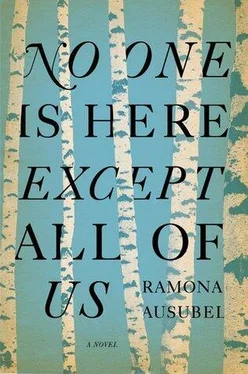Vlad took a wheelbarrow and some men with him to where the cabbages were still growing, paler and softer. He wanted to pile up whatever there was and watch over it.
The villagers said their prayers in their heads, a tiny orchestra, but did not let them get out. Nothing crumbled because of the people’s prayers.
The stranger’s life was the same as before, except now the jeweler slept next to her, and into each other’s ears in the dark of night, they laughed and they whispered and they pinched. When they were together, their bodies were entirely uncrushable, even by fear, that most invisible — and heaviest — of weights.
The weather grew colder and still everyone waited for the terrible end. Fat arms of vines scrawled out of the ground and choked trees. They wound themselves into windows like thieves. And then there was the sinking. At first it was dismissible. People felt a little taller than they had, that was all. They had to stoop farther to get through the door. When Vlad smacked his head on the lintel, he knew the house was outshrinking him. Some houses declined faster than others. Some slumped on one side, others descended evenly, like ships whose hulls were heavy with bilgewater.
Buttery morning light brought the stranger out of the barn to find the two best milk cows lying dead on the ground. She examined them and found no wounds. This was not the work of a fox. They were facing each other, as if a pact had been made, as if they had decided to go together to a better place. The stranger petted each on the head. “I understand,” she whispered, wishing she could give the cows her blessing but knowing how much the villagers needed them. “I’m sorry to do this,” she told them as she kneeled down, milk bucket in hand, and pulled at the cool udders until they were empty. She prayed for forgiveness for draining these corpses dry. When she announced the loss to the others, fear of shortage swept through like a sandstorm. Everyone looked at the flock of goats, who backed away, bleated. They were doing what they could. They had no more to give. No one did.
Instinct told them to condense, to stay close. Without discussion, all the villagers left their capsizing homes and moved into the barn. People brought their favorite sweaters and best pots. They went for their wrenches and fur shawls. Then for their meat tenderizers, their butter churns and, of course, the sacks of coins buried under the rosebushes. They rationed flour, butter, eggs. Everyone wore two words on their lips: Not Enough.
The villagers remembered sitting down with their children and eating supper, watching the fire in the stove tongue the air dry, discussing one thing or another and even playing a game of marbles on the floor before the husband and wife stood together over their young ones and sang a song to put them away. Their old lives had gone on so regularly it made them feel sick.
And frost started to form and the earth got its crust of ice. In preparation for the moment when everyone might freeze to death in one solid mass, as now seemed likely, and wanting nothing of their lives left behind, the villagers ventured out to take even the things they had always wished to get rid of. The whole drawerful of broken things — cups, eyeglasses, dolls waiting to be fixed whose eyes rolled around in their sockets, floppy and loose. The constellations on the walls became blocked by towers of objects. No one wanted to let go of anything they used to touch back when touching it meant nothing.
And the stranger and the jeweler held each other close. They learned — ever so quietly — every ridge, every slope of each other’s bodies. The fact of one ankle held between two calves, four arms like a lock keeping everything good inside. He wanted her to be anything and everything she possibly could be. The biggest wallop of desperation, the brightest sweep of joy. If the stranger were burning hot, the jeweler would have become a lick of fire. If she were freezing cold, he would have become the spear of an icicle. If she was a swamp, he would be algae, growing over the entire surface of her.
If the people had been put out to sea, would their odd cargo have sustained them? On their lost ark of a world, floating alone, unpulled by the moon, unwarmed by the sun, the people waited to be dragged up onto some dry shore, some island where flowering trees might drop petals into their salty hair, and not long after, globes of waxy fruit.
THE BOOK OF THE SEA AND THE SUN
When Igor passed by, the headlines all but walked off the yellowed newspapers and forced him to read them. German troops occupy Hungary. USSR retakes Odessa. Allies invade Rome. Tens of thousands killed on the beaches of France. USSR retakes Minsk. U.S. takes Guam. USSR invades German-occupied Romania. Allies liberate Paris. Soviet troops capture Warsaw. No story appeared about a miniature world discovered in the crook of a wide river. Igor scolded himself for even considering that the newspapers might have meant something. “Stupid Igor, stupid brain,” he said to himself. “Never forget that this is all in your head.”
For Francesco, there was only one fact of the war that truly scared him: Italy had joined the Allied forces. Technically, he suspected that his prisoner, captured for the now opposing side, ought to have been freed. But his island had been floating on the same deep blue sea for thousands upon thousands of years. It had not only seen empires rise and fall, but witnessed their relics dug up out of the soil and sold to museums. No one on the island labored under the delusion that politics meant anything. It did not matter to them if their sons switched sides, only if they came home alive. Their ability to continue living was the only real stake the island had ever had in this war. So far, no one had questioned the prisoner’s fate, and Francesco planned to enjoy the company as long as it lasted.
Igor and Francesco went to the sea each morning and swam. They dove under the water so their hair went flying back behind. They stood on rocks and jumped in, judging each other’s dives based on the lack of splash. They learned flips. When they got cold it was to the rocks with them, where the flat heat would leave red rounds on their backs. Even Igor turned a nice toasted brown. He shared bread crumbs with the yellow-legged gulls, who failed at their attempts to appear cold and ungrateful.
“It still isn’t raining,” Igor said.
“No, no rain today.”
“At home it was raining. It was flooding. I wonder if it stopped there, too.”
Whenever Igor mentioned anything about home, Francesco’s muscles tightened. He tried to change the subject, to draw Igor’s attention back to the spectacular glory of the island. “In the springtime, this whole hillside will be covered in tiny purple flowers,” he said. “It looks like a painting. You will love it so much.”
Francesco’s mother had them for lunches. They ate all the things she could make. They were filled up with food in such large deposits that it made them stupid for the rest of the day. They looked around fogged and dreamy. So much bean soup and stewed tomatoes and roasted meat that the world seemed practically motionless.
Full and clean, Igor brought the only part of the newspaper he loved — the advertisements — into bed. Dark-eyed men squinted from underneath crisp straw fedoras.
“I would wear that hat,” Igor said.
“It would look great on you.”
In the evening Igor and Francesco went to the square and played checkers with the other men, drank wine and flirted with the girls who strolled around and around, their arms hooked. The men ate things pulled from the sea and fried. They smoked the thin fingers of cigarettes. They talked halfheartedly about the war and who would win and which dictator was a bigger snake, and how much better it would be if their little island could secede and float peacefully away. Igor thought to himself that this was getting to be a very long dream. He looked forward to telling his family everything he had seen; he also hoped not to wake up just yet.
Читать дальше












